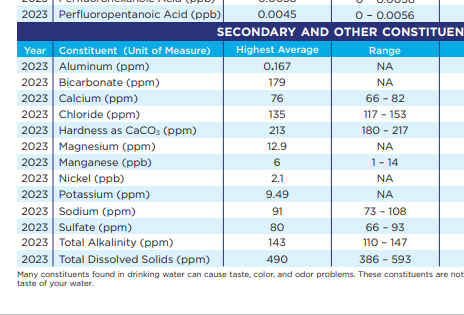I finally went with an RO system and adjust the salts. I used to live in an area where Lake Michigan was the water supply and the water was very good for my beers. Now I live in an area where we get our water from wells and the water is very hard. I could never make good beer from it.
My Wards lab water report:
pH 7.6
Total Dissolved Solids (TDS) Est, ppm 592
Electrical Conductivity, mmho/cm 0.99 Cations / Anions, me/L / 12.1 12.0
ppm
Sodium, Na 61
Potassium, K 7
Calcium, Ca 86.4
Magnesium, Mg 58
Total Hardness, CaCO3 457
Nitrate, NO3-N 0.2 (SAFE)
Sulfate, SO4-S 59
Chloride, Cl 7
Carbonate, CO3 < 1.0
Bicarbonate, HCO3 503
Total Alkalinity, CaCO3 414
Fluoride, F 0.79
Total Iron, Fe 0.49
"<" - Not Detected / Below Detection Limit
Sorry about the formatting.
Going with RO water and added salts made my beer very drinkable. I mainly brew pale beers with low alcohol, 4%-5%.
















































![Craft A Brew - Safale S-04 Dry Yeast - Fermentis - English Ale Dry Yeast - For English and American Ales and Hard Apple Ciders - Ingredients for Home Brewing - Beer Making Supplies - [1 Pack]](https://m.media-amazon.com/images/I/41fVGNh6JfL._SL500_.jpg)









